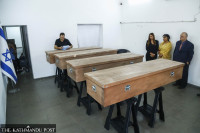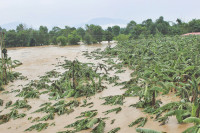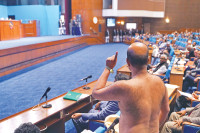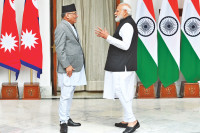Health
Yearender 2022: The year of diseases
Health authorities admit that the government utterly failed to protect the people in times of emergency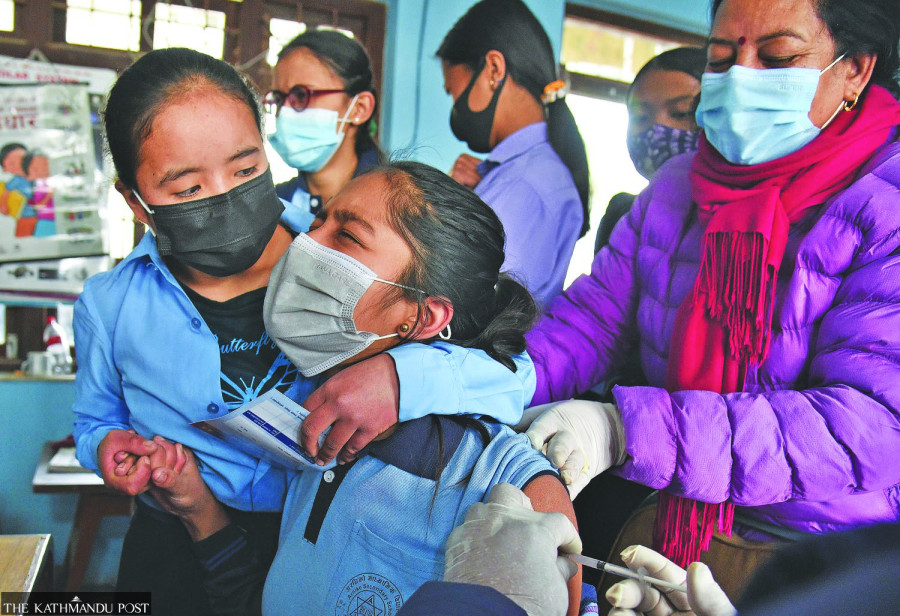
Arjun Poudel
The year 2022 was the year of diseases.
The third wave of the Covid-19 pandemic, triggered by the Omicron variant, had claimed the lives of hundreds by the beginning of 2022. The government’s response was indifferent because political upheavals were brewing up to keep it occupied.
The infection caseload peaked at more than 12,300 daily on January 20.
With infections spiking, the government began administering booster shots from January 17. The vaccines were first given to frontline workers and elderly people, and then to others.
The authorities also administered Covid-19 vaccines to children above five years of age.
There were constant upheavals in Nepal’s politics, and lack of seriousness among the country's leaders caused the pandemic to explode. Health authorities admitted that the citizens lay uncared for despite the emergency amid the fractured politics, instability and greed for power
Nepal's familiar political instability persists, and difficult times are ahead for the people, particularly the poor sections of society, analysts say.
According to health officials, the vaccine coverage in the first and second phases was good, but the uptake of booster shots slowed to a crawl, despite the existence of sufficient doses.
On March 10, Nepal threw the door wide open to tourists, removing all pre-arrival testing requirements for fully vaxxed travellers in a bid to recharge its moribund tourism industry.
Infection rates had declined significantly by the end of 2022. But public health experts have been alarmed by the surge in new cases in many countries in East Asia, including Japan and South Korea.
Nepali experts say that even if new cases have dropped sharply, infection might be spreading in communities.
Case detection has declined, as only relatively healthy people planning to leave the country or returning from abroad are undergoing coronavirus testing, experts said.
“Even if new cases have declined significantly, there is a risk of a new surge,” said Dr Biraj Karmacharya, an epidemiologist. “We should not be too worried, but vigilance should still be high.”
The third wave
According to a United Nations International Children's Emergency Fund report, Nepal experienced the Covid-19 third wave with the Omicron variant between January and February 2022.
The reported number of new Covid-19 cases jumped at an alarming rate. For example, daily cases swelled from 342 on January 1 to 3,703 cases on January 15.
This third wave surpassed the peak of the second wave, driven by the Delta variant, as more than 10,052 new daily cases were reported on January 20, with 57,328 active cases and a 47.9 percent positivity rate.
Fearing a possible Omicron surge, the government decided to close the country's schools from January 11 to 29. On January 17, the authorities announced stricter restrictions.
On January 19, the World Health Organisation said that though Omicron infections may be less severe, it was not a mild disease. From late January onwards, Covid-19 cases saw a downward trend in Nepal.
using past experience, we can make the recovery phase better, improve our system, fill the gaps and address all shortcomings.”

Schools reopened on February 13 for online classes, and vehicular and other restrictions were eased. Subsequently, schools began in-person classes.
The total number of Covid-19-related fatalities since the beginning of the pandemic in Nepal had reached 11,936 as of the end of February.
With the pandemic slackening, vaccine uptake too started to drop. According to the Ministry of Health and Population, only 7.97 million people or 27.3 percent of the total population have taken booster shots so far.
The government had decided to provide the second booster shots months ago, but the plan never materialised. Still, there are concerns.
“As the Covid-19 virus is continually mutating, new variants and sub-variants could emerge at any time,” said Dr Karmacharya. “There is a need to focus on increasing the uptake of booster shots.”
Dengue menace
Dengue is a viral infection transmitted to humans through the bite of infected mosquitoes.
At least 62 people have died and around 54,000 others have been infected with the virus, which has spread to all 77 districts of the country. The mosquitoes have been found even in the cold mountain regions.
Covid cases went down steeply in the autumn, but hospital beds across Nepal began filling up again due to a sudden rise in Dengue cases.
“I can never forget the chaos scenario in the hospital that I experienced in 2022,” said Laxmi Dongol, a local from Paknajol. “I waited an entire day in front of the hospital’s emergency, but doctors sent me home prescribing paracetamol in the evening. I had a hard time finding paracetamol too.”
In government-run hospitals, five patients were sharing one bed. People were being treated on the floor and in waiting rooms. Patients with saline bottles hanging over them were waiting in wheelchairs, ambulances, buses and waiting rooms for a doctor to come and treat them.
“Negligence on the part of management to take preventive measures, lack of public awareness of the risks, and delays in seeking health care after infection could be among the reasons for the large number of deaths from the Dengue virus,” said Dr Keshav Deuba, a public health epidemiologist.
“The government did not take the case seriously even after thousands of people had been infected with the virus.”
Paracetamol vanishes
Nepal’s poor healthcare system was exposed during the Covid-19 pandemic.
Then the paracetamol crisis appeared. The medication is cheap and generally considered to be safe and effective. But when dengue reached its peak, the country did not have enough stocks of paracetamol, an essential drug recommended for the treatment of most painful and febrile conditions.
Various brands of paracetamol vanished from the market, and patients were desperately looking for the life-saving drug. It costs Rs1 per tablet and is good for treating pain, dengue fever, malaria, typhoid and infectious diseases.
The government could not ensure its availability. But health authorities blamed the shortage on hoarding by the public.
Doctors say hoarding essential medicines without need means the people have no trust in the government. This lack of trust stems from the oxygen shortage that occurred during the second wave of Covid, and resulted in the deaths of hundreds who could otherwise have been saved.
But Nepal has not learnt from its past mistakes, according to health authorities.
Rising incidence of several other diseases has raised concern. People are dying young.
Neonatal deaths have not declined in the last five years, according to the findings of the Nepal Demographic and Health Survey 2022 carried out by the Ministry of Health and Population. The study shows that 21 children per every 1,000 live births die within a month. There has been no change in this statistic since 2016.
The government’s target for the Sustainable Development Goals (SDG) of the United Nations was to reduce the neonatal mortality rate to 16 deaths per every 1,000 live births by 2022.
The report shows that the under-five mortality rate has declined to 33 from 39 in 2016, and the infant mortality rate to 28 from 32 in 2016 per every 1,000 live births. The government had targeted to reduce the under-five mortality rate to 27 and the infant mortality rate to 20 per every 1,000 live births by 2022 to meet the SDG targets.
The study also shows no significant progress in nutrition status. Immunisation coverage has also declined compared to the past, according to the report.
Lost trust
Trust in healthcare services provided by government facilities has been declining, according to experts.
“People generally do not want to go to state-run health facilities,” said Dr Deuba, a public health epidemiologist. "Those who cannot afford private care also do not want to go a second time even in an emergency due to the poor quality of service at these health facilities. This is dangerous. What we should not forget is that healthcare services at private centres are very costly.”
The Covid and dengue viruses could again wreak havoc in the country, public health experts say.
Gaining the trust of the general public is absolutely necessary to deal with any emergency, outbreak, epidemic or pandemic, according to doctors.
“We do not lack experience,” said Dr Deuba. “By using past experience, we can make the recovery phase better, improve our system, fill the gaps and address all shortcomings.”




 13.12°C Kathmandu
13.12°C Kathmandu
